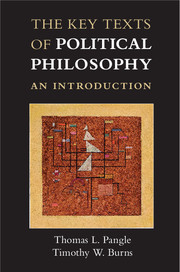Book contents
- Frontmatter
- Dedication
- Contents
- Acknowledgments
- Introduction
- Part I Classical Political Philosophy
- Part II Biblical Political Theology
- Part III Modern Political Philosophy
- Part IV Modernity in Question
- 11 Rousseau’s First and Second Discourses
- 12 Marx and Engels: The Communist Manifesto
- 13 Tocqueville’s Democracy in America
- 14 Nietzsche and His Zarathustra
- Name Index
- Subject Index
- References
12 - Marx and Engels: The Communist Manifesto
Published online by Cambridge University Press: 05 October 2014
- Frontmatter
- Dedication
- Contents
- Acknowledgments
- Introduction
- Part I Classical Political Philosophy
- Part II Biblical Political Theology
- Part III Modern Political Philosophy
- Part IV Modernity in Question
- 11 Rousseau’s First and Second Discourses
- 12 Marx and Engels: The Communist Manifesto
- 13 Tocqueville’s Democracy in America
- 14 Nietzsche and His Zarathustra
- Name Index
- Subject Index
- References
Summary
Karl Marx (1818–1883) and his junior partner, Friedrich Engels (1820–1895), laid the theoretical foundation of modern communism, which aims to bring about a new world order born out of the overthrow of “bourgeois capitalism.” The latter is the phrase Marx and Engels applied to the historically mature form of the system of competitive, acquisitive, commercial individualism that is articulated and defended in the thought of Hobbes, Locke, Montesquieu, and their revisers – including Hume and Adam Smith. The term “bourgeois” derives from Rousseau, who was the first to create and to make stick that pejorative label for the society and way of life designed and successfully promoted by the Enlightenment. In the century and a half after Rousseau, European thought was dominated by attempts to find a solution to the problematic that Rousseau had laid out.
History vs. Nature as Norm
The most important turn taken in post-Rousseauean theorizing was to “the philosophy of history”: A new way of thinking, rooted in the contention that what Rousseau had discovered, without his fully realizing it, was that we must take our orientation in life, our positive normative standards, not from the idea of a permanent human nature but instead from a conception of humanity as coming into full maturation through history. If or since modern, civilized existence – and thus what we understand as human – is not a product of our original nature (which was that of a being close to an animal) but instead arises out of a historical development over a long time, then we should seek for standards for our human existence in that historical process and its outcome. Through history, humanity has gradually and painfully brought itself out of its original “natural” condition toward a fully completed “nature” or condition of being: “The entire so-called history of the world is nothing but the begetting of man through human labor, nothing but the coming-to-be of nature for man.”
- Type
- Chapter
- Information
- The Key Texts of Political PhilosophyAn Introduction, pp. 365 - 380Publisher: Cambridge University PressPrint publication year: 2014

